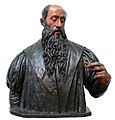Johan Gregor van der Schardt

Johan (or Jan) Gregor van der Schardt (c. 1530/31 in Nijmegen, Netherlands – after 1581 in Denmark) was a sculptor from the Northern Renaissance.
Life[edit]
He toured Italy in the 1560s and among others worked in Bologna.[1] From 1569 to 1576 he was in the service of Maximilian II, Holy Roman Emperor in Vienna, and subsequently took commissions in Nuremberg, where he specialised in painted terracotta busts. Such a bust includes a self-portrait of about 1573, one of the earliest such examples by a sculptor.[2][3]
From c. 1576 to c. 1580, he worked on the construction of the Uraniborg observatory of the Danish astronomer Tycho Brahe on the island of Hven.[4]
After 1576 he moved to the royal court of Denmark (with a return to Nuremberg in 1579) where he is presumed to have worked during the 1580s and died in the early 1590s,[2] perhaps at Uraniborg on 30 November 1591.
Unusually for a non-Italian artist, his work was praised by Giorgio Vasari.[1]
Gallery[edit]
-
Mercurius, ca. 1570/76, Kunsthistorisches Museum
-
Neptune, Metropolitan Museum of Art
-
Portretbuste Willibald Imhoff the Elder, ca. 1570 - ca. 1590
-
Portrait buste Anna Imhoff, ca. 1580, Bodemuseum
-
Portrait buste Johann Neudörfer the younger
References[edit]
- ^ a b "Johan Gregor van der Schardt". J. Paul Getty Museum. Retrieved 2012-12-06.
- ^ a b "Jan Gregor van der Schardt". Amsterdam: Rijksmuseum. Archived from the original on 2014-10-12. Retrieved 2012-12-06.
- ^ Scholten, Frits (2007). "Johan Gregor van der Schardt and the Moment of Self-Portraiture in Sculpture". Simiolus: Netherlands Quarterly for the History of Art. 33 (2007/8) (4): 195–220. JSTOR 25608493.
- ^ "UNESCO Astronomy and World Heritage Webportal - Show entity". www3.astronomicalheritage.net. Retrieved 2019-11-07.
External links[edit]
 Media related to Johan Gregor van der Schardt at Wikimedia Commons
Media related to Johan Gregor van der Schardt at Wikimedia Commons





